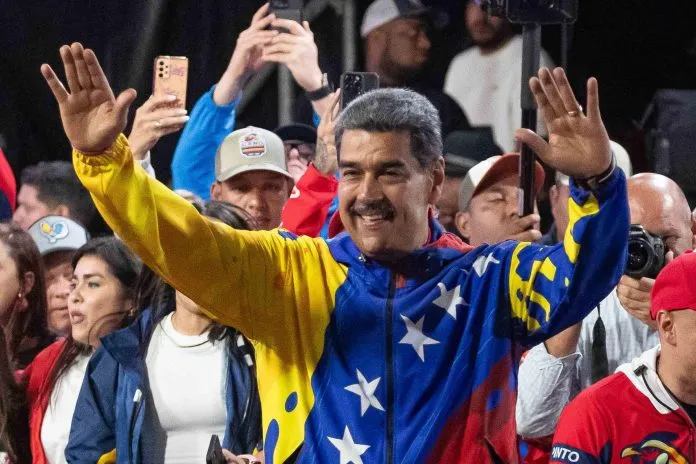The recent presidential election in Venezuela, which resulted in Nicolás Maduro being declared the winner by the National Electoral Council (CNE), has sparked a wide range of international responses. This article delves into the detailed reactions from various countries regarding the election results, the concerns raised about the electoral process, and the contrasting positions taken by different nations.
Election Outcome Announced
Nicolás Maduro’s Declared Victory
On Sunday night, the Venezuelan National Electoral Council (CNE) announced the re-election of Nicolás Maduro for another term as President. According to the CNE, Maduro received 51.20% of the votes, totaling 5,150,092, while his main challenger, Edmundo González Urrutia, garnered 44.20%, amounting to 4,445,978 votes. The voter turnout for this election was reported to be 59%.
The announcement, made by Elvis Amoroso, the president of the CNE, included a note of thanks to international observers who were present during the election process. Amoroso also revealed that there had been an incident involving an attack on the data transmission system, prompting a request for an investigation into the matter.
El régimen de Maduro debe entender que los resultados que publica son difíciles de creer. La comunidad internacional y sobre todo el pueblo venezolano, incluyendo a los millones de venezolanos en el exilio, exigimos total transparencia de las actas y el proceso, y que veedores…
— Gabriel Boric Font (@GabrielBoric) July 29, 2024
International Reactions and Concerns
United States
From Tokyo, U.S. Secretary of State Antony Blinken expressed serious concerns about the validity of the election results announced by the Venezuelan electoral commission. Blinken questioned the legitimacy of the process and the extent to which it represented the will of the Venezuelan voters. He conveyed his apprehensions alongside his counterparts from the Quad alliance, which includes the United States, Japan, Australia, and India. Blinken emphasized, “We have serious concerns that the results announced do not reflect the will of the voters or the people of Venezuela.”
Argentina
In Argentina, President Javier Milei dismissed the Venezuelan election results early on Monday. He rejected the notion of recognizing what he termed another “fraud” in Venezuela. Milei argued that the Venezuelan people had clearly expressed their desire to end what he referred to as a “communist dictatorship” under Nicolás Maduro. On social media, Milei claimed that the data indicated a resounding victory for the opposition and called for international acknowledgment of this outcome, which he framed as a response to years of socialism, misery, and decline.
Chile
Chilean President Gabriel Boric also voiced skepticism about the election results, describing them as “difficult to believe.” Boric stated that Chile would not recognize any result that could not be verified. Through social media, Boric criticized the Maduro regime and stressed the need for complete transparency in the electoral process. He highlighted the demand for impartial international observers to verify the accuracy of the results and reaffirmed Chile’s stance on only accepting verifiable results.
Peru
Peruvian Foreign Minister Javier González-Olaechea issued a strong condemnation of the election results shortly after the CNE’s announcement. González-Olaechea accused the Venezuelan government of committing fraud and expressed Peru’s refusal to accept any results that violated the will of the Venezuelan people. His statement reflected a firm stance against the perceived irregularities and fraudulent actions in the election process.
Costa Rica
Costa Rican President Rodrigo Chaves Robles made a clear declaration rejecting the results of the Venezuelan election. In an official statement, Chaves Robles labeled the proclamation of Nicolás Maduro as “fraudulent.” Costa Rica joined other democratic governments and international organizations in advocating for respect for the will of the Venezuelan people and denouncing what it viewed as a fraudulent election outcome.
Guatemala
Guatemalan President Bernardo Arévalo de León also expressed significant doubts about the Venezuelan election results. In an official message, Arévalo de León called for transparent and accurate results that align with the will of the Venezuelan people. He stressed the importance of international observation in ensuring the integrity of the election process and emphasized the need for credible reports from electoral observation missions.
Support and Congratulations
Bolivia
In contrast to the criticisms from several countries, Bolivian President Luis Arce congratulated Nicolás Maduro on his electoral victory. Arce noted the significance of the election date, which coincided with the anniversary of the birth of the late leader Hugo Chávez. Arce praised the Venezuelan people and President Maduro, celebrating the victory as a way to honor Chávez’s legacy.
Cuba
Cuban President Miguel Díaz-Canel also extended his congratulations to Maduro, describing the electoral victory as a “triumph of dignity.” Díaz-Canel’s message highlighted the Cuban commitment to the Bolivarian and Chavista revolutions, and he reaffirmed Cuba’s support for Venezuela. His statement emphasized the solidarity between the two nations and the importance of supporting the Venezuelan government.
Nicaragua
Nicaraguan President Daniel Ortega and Vice President Rosario Murillo offered their congratulations to Nicolás Maduro as well. In a letter released shortly after the CNE’s initial report, Ortega and Murillo celebrated Maduro’s victory as a significant achievement. They expressed solidarity with the Venezuelan people and the Maduro administration, framing the election outcome as a tribute to Hugo Chávez.
Conclusion
The international reactions to Venezuela’s recent presidential election reveal a polarized response. While some countries have questioned the legitimacy of the electoral process and expressed serious concerns about its transparency, others have offered congratulations and support to Nicolás Maduro. The diverse reactions underscore the complexities of the political landscape in Venezuela and highlight the global implications of its electoral outcomes.
As the situation continues to develop, the focus will remain on the ongoing efforts to address the concerns raised by various international actors and to ensure that the democratic process is upheld in Venezuela. The contrasting positions of different nations reflect the broader geopolitical context and the significance of the election for both Venezuelan and global politics.


